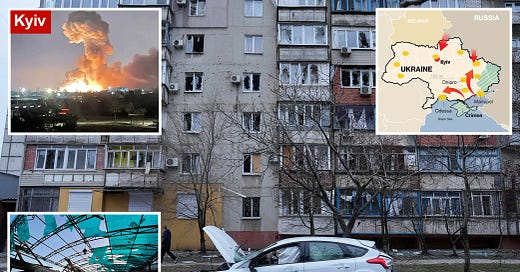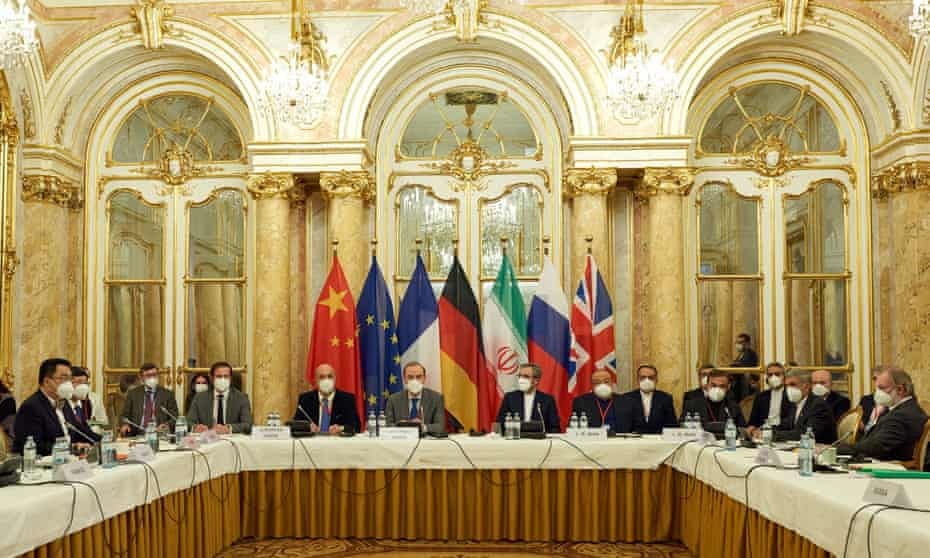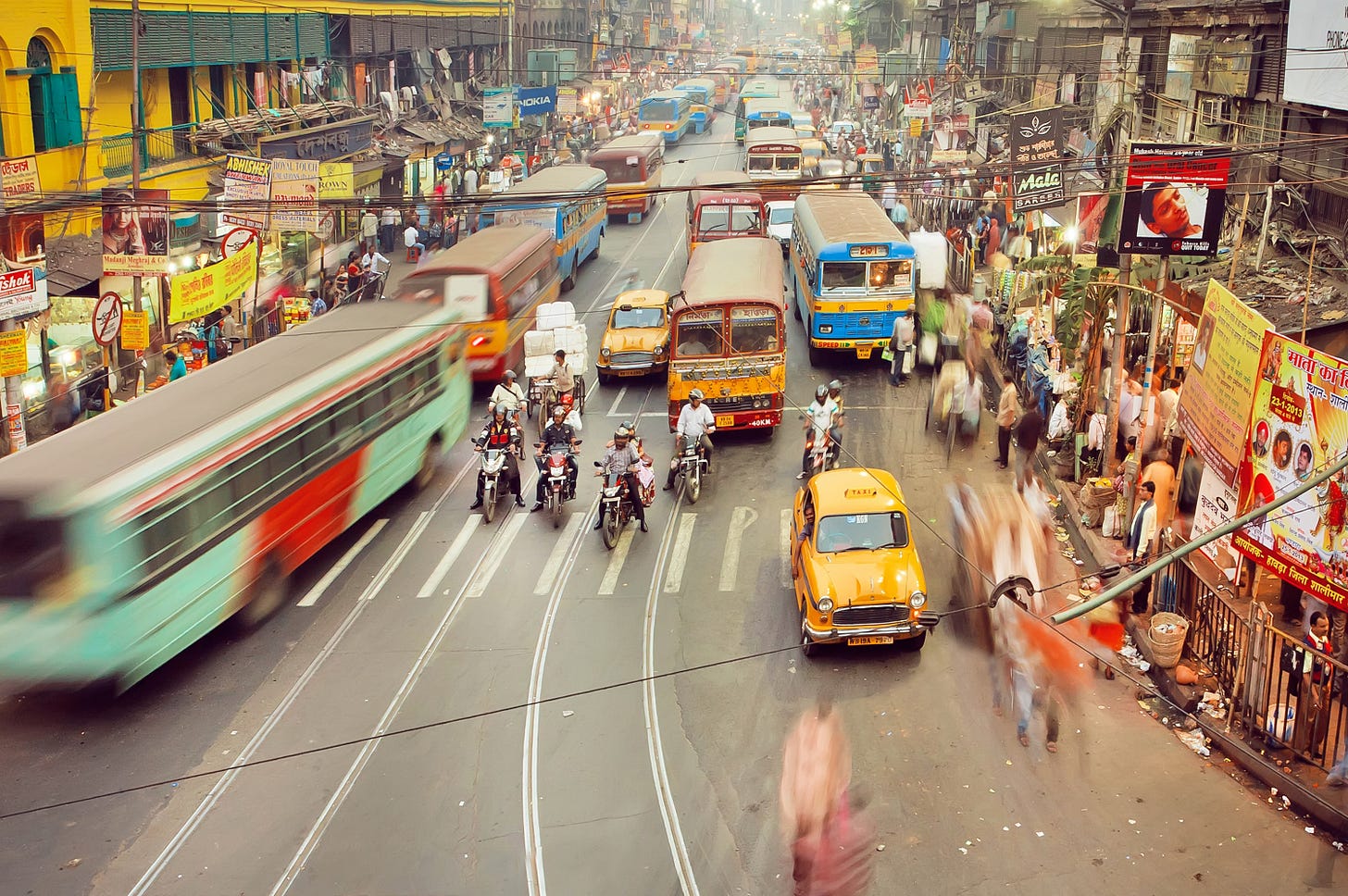Emerging Markets Daily - March 6
Ukraine War 'Severe Impact' on Global Economy: IMF, China Risks, Russia Complicates Iran Nuke Talks, Brazil Exits Recession, Amazon vs Reliance in India
The Top 5 Stories Shaping Emerging Markets from Global Media - March 6
War in Ukraine Will Have “Severe Impact” on Global Economy, IMF Says
Channel News Asia
“The International Monetary Fund on Saturday said it expected to bring Ukraine's request for US$1.4 billion in emergency financing to its board for approval as early as next week and was in talks about funding options with authorities in neighboring Moldova.”
"‘..While the situation remains highly fluid and the outlook is subject to extraordinary uncertainty, the economic consequences are already very serious,’ the IMF said in a statement…’The ongoing war and associated sanctions will also have a severe impact on the global economy,’ it warned, noting that the crisis was creating an adverse shock to inflation and economic activity at a time when price pressures were already high.”
“It said price shocks would be felt worldwide, and authorities should provide fiscal support for poor households for whom food and fuel made up a higher proportion of expenses, adding that the economic damage would increase if the war escalated.”
“Sweeping sanctions imposed on Russia by the United States, European countries and others would also have ‘a substantial impact on the global economy and financial markets, with significant spillovers to other countries.’” Channel News Asia reports.
China Remains the Biggest Hidden Risk for Emerging Markets
Bloomberg
“As traders grapple with the breakout of war in Europe, the prospect of a new regulatory crackdown in China is posing a larger, yet less appreciated, risk to emerging-market assets.”
“A meltdown in Chinese technology shares after authorities told food-delivery platforms to cut their fees last month has fueled bigger losses for MSCI Inc.’s Emerging Markets Index than even Russia’s invasion of Ukraine.”
“That’s because China accounts for about 30% of the gauge, while Russia is just over 1.5%. Traders are now concerned that this week’s meeting of the National People’s Congress could precede a renewed crackdown -- even as opening remarks from Premier Li Keqiang emphasized that venture capital still has a role to play.”
“‘China has more contagion effect than Russia,’ said Brendan Mckenna, a strategist at Wells Fargo in New York. ‘When a shock occurs in China, just about all of EM reacts. A shock in Russia usually just spills over to regional Eastern Europe.’
“Traders are bracing for further takeaways from the National People’s Congress, China’s biggest political event before a twice-a-decade party leadership reshuffle slated for later this year. So far, policy makers have set an aggressive economic growth target of about 5.5%, adopted measures to keep housing prices stable and vowed to address social issues such as human trafficking. Premier Li also described the prevention of ‘unregulated expansion of capital’ as one of last year’s achievements.” Bloomberg reports.
Russian Demands Complicate the Fate of US-Iran Nuclear Deal
Financial Times
“Russia is seeking written guarantees from Washington that US sanctions imposed on the country do not impede its ability to trade with Iran, a move that risks complicating efforts to revive the 2015 nuclear accord.”
“Moscow made the demand as western officials said they were close to a deal with Iran that would bring the US back into the agreement that Tehran signed with world powers. This would mean the Islamic republic limiting its nuclear activity in return for sanctions relief.”
“Russia, a signatory to the accord along with the UK, France, Germany and China, has been involved in the negotiations in Vienna aimed at saving the deal. Sergei Lavrov, Russian foreign minister, told reporters on Saturday that Moscow wanted the US guarantees to ensure sanctions on Russia did not damage ‘our right to free and full trade, economic and investment co-operation and military-technical co-operation with the Islamic republic’”
“On Sunday, Antony Blinken, US secretary of state, said Washington’s interest in rejoining the deal remained ‘irrespective of where we are in our relationship with Russia as a result of its aggression in Ukraine. I think we’re close [to a deal], but there are a couple of very challenging remaining issues,’ Blinken said. ‘We’ll see where we get in the coming days. But it is really coming down to whether we can resolve a couple of outstanding issues. If we can, we’ll get back on the deal. If we can’t, we won’t.’” The Financial Times reports.
Brazil Exits Recession, But Faces Tough Year Ahead
Buenos Aires Times
“Brazil exited recession in the fourth quarter, the government said Friday, though weak growth and high inflation still dog Latin America's biggest economy as President Jair Bolsonaro gears up to seek re-election in October.”
“Gross domestic product (GDP) grew 0.5 percent for the period from October through December, reversing its 0.3-percent and 0.1-percent contractions in the previous two quarters, said the national statistics institute, IBGE. That brought GDP growth for 2021 to 4.6 percent on the year, erasing the economy's painful contraction in pandemic-battered 2020, which was revised to 3.9 percent.”
“But the economy remains a headache for far-right leader Bolsonaro, with growth still weak and inflation hitting Brazilian households hard.”
“Uncertainty fueled by Bolsonaro's expected election showdown with leftist ex-president Luiz Inácio Lula da Silva and international turmoil around Russia's invasion of Ukraine will likely weigh heavily on the Brazilian economy this year, analysts say.”
“Economists polled by Brazil's Central Bank currently forecast GDP growth of 0.3 percent for 2022. Brazil's annual inflation rate came in at 10.06 percent last year, crashing through the central bank's target of 3.5 percent. The Central Bank has responded with one of the most aggressive tightening cycles in the world, rapidly raising the benchmark interest rate to 10.75 percent from an all-time low of two percent in March 2021.” Buenos Aires Times reports.
How Reliance Stunned Amazon in Battle for India’s Future Retail
Reuters
“At a large Future Retail supermarket in Mumbai last week, workers were unloading hundreds of bright blue grocery crates belonging to India's biggest retailer Reliance.”
“Prospective customers were turned back by security, disappointed at the closed state of the store that still carries the signage of Future's biggest brand, Big Bazaar, but which will likely soon be rebranded as a Reliance outlet.”
“Across India, similar scenes are being played out as Reliance Industries, India’s biggest conglomerate run by Mukesh Ambani, the country's richest man, presses ahead with a shock de facto takeover of prized retail real estate that Amazon.com Inc has been keen to take part-ownership of.”
“…Reliance's takeover began with utmost stealth on the night of Feb. 25 when its staff began arriving at Future stores. Many in Future's management were in the dark about the plans as store employees from all over the country frantically began to call, according to people with direct knowledge of the matter.”
"‘It was tense, everybody was panicking. We didn't know who they were. They wanted access and seniors didn't know about it,’ a New Delhi Big Bazaar store employee said, describing what happened around 8 p.m. that day.”
“…Amazon, which has a stake in a separate Future Group unit that it argues prevents Future from selling retail assets without its permission, has called the supermarkets and other stores an ‘irreplaceable’ network in a sector worth $900 billion in revenues annually.”
“…Whatever the outcome of the talks, analysts say Amazon had gravely underestimated Reliance.” Reuters reports.
“The greater the obstacle, the more glory in overcoming it.” - Moliere






